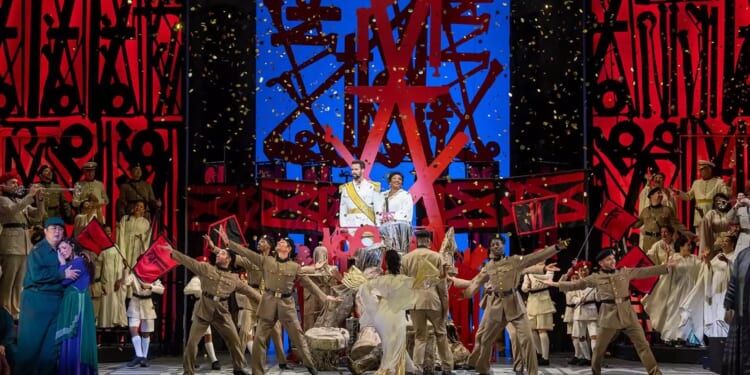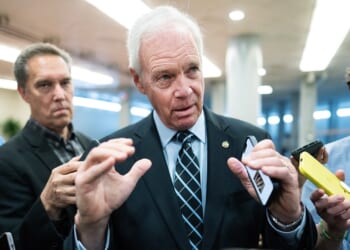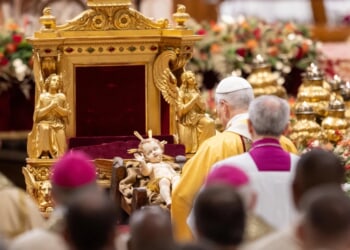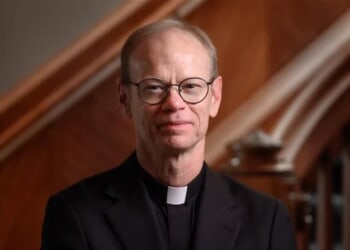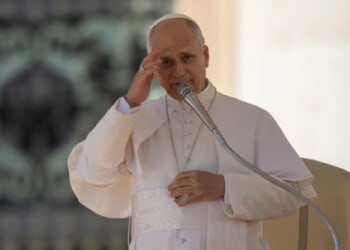“I may have revealed strategic information,” admits Radamès, the hapless soldier in the Washington National Opera’s season-opening revival of Giuseppe Verdi’s Aida, in translated supertitles that read more like evasive congressional testimony than the operatic confession unfolding on stage. His original lines are more literally translated as “My incautious lips professed a fatal secret, it is true” (Profferse il labbro incauto/ Fatal segreto, è vero), but try typing that in a private group chat with your co-conspirators. In any case, here and elsewhere in the poorly translated libretto the stilted Washington-speak certainly got a laugh from the audience at moments that rarely inspire mirth.
Radamès has indeed betrayed his country, having revealed to his sweetheart Aida, an enslaved Ethiopian princess, the route his army will take to invade her home country. Aida’s father, Amonasro, the king of Ethiopia, put Aida up to wheedling that information out of the Egyptian general, and has positioned himself to overhear the revelation. His moment of triumph, along with Radamès’ painful realization of his disgrace, is interrupted by the sudden intrusion of Amneris, the Egyptian king’s daughter, who jealously loves Radamès but knows she has a rival in Aida and seeks to punish them both. Captured by the High Priest, Radamès is condemned to death by immurement, where Aida joins him to share his fate as a repentant Amneris prays for their lost souls.
A new atmosphere reigns at the John F. Kennedy Center for the Performing Arts, where a Trump-appointed board oversees a revamped program of events. The revitalization was on full display in September at a grand gala held to benefit the National Symphony. Washington National Opera opened its new season—its seventieth—with much less fanfare. The Kennedy Center’s interim president, Ric Grenell, was on hand flanked by a few dignitaries, while WNO’s general director, Timothy O’Leary, greeted the audience with the good news of a recent $8.6 million bequest.
Starting a new season with a revival, particularly in a milestone year, was ill-advised. Rather than offer something new, the artistic director, Francesca Zambello, brought back her Aida, last performed here in the 2017–18 season. Her director’s note tries hard to “personalize” what is already an intensely personal opera but at the same time decontextualizes the opera by making it about “any two countries” at war. Zambello’s solution is to set the work in an “abstracted” nowhere, a mishmash of vaguely contemporary styles.
The approach is far from original. Years before Zambello, Olivier Py took a similar line in his Paris production, as did, more recently, Robert Carsen at the Royal Opera House in London. Here, in Zambello’s desperate attempt to make the action more “relevant,” the production, using Anita Yavich’s gaudy costumes, suggests any number of third-world conflicts. The usually talented Michael Yeargan’s bland sets, a succession of structures made of slabs, are decorated with designs by the visual artist Marquis Lewis, who goes by the moniker RETNA. We are told those were “inspired by calligraphy and hieroglyphics.” In fact they look like neither, more closely resembling graffiti, the medium in which Lewis got his professional start on the streets of his native Los Angeles. In an irony that may not entirely have been lost on the audience, ridding the nation’s capital of graffiti has been a major Trump-administration initiative. But here, distracting and ultimately meaningless graffiti takes pride of place. The disharmony is furthered by the insertion of a bland contemporary-dance sequence of uniformed soldiers where the ballet in the opera’s grand triumphal scene should be.
Reducing the opera to interpersonal romantic conflict would be a poor choice anywhere. Aida’s grandeur—the pharaonic setting, the tantalizing rituals, the inescapable power of the Egyptian priests—not only defines the work but also magnifies the tragedy of its characters. Without the stateliness, Aida and Amneris’s squabbling over Radamès becomes petty and trite, in this performance again inspiring laughter at moments that should convey soulful anguish, sincere passion, and terrifying risk.
Zambello’s direction also contributed to this unfortunate descent into soap opera, and the singing was too uneven to help. The tenor Adam Smith got off to a noticeably slow start as Radamès but radiated a reasonably strong tone in the part’s demanding moments. In her WNO debut, the soprano Jennifer Rowley offered a pleasant middle register that suited Aida in the ensemble singing. Her ascents lacked strength, however. Her signature Act III aria, “O patria mia,” lacked the swelling scales that its best exponents have memorably brought out. Raehann Bryce-Davis’s purring mezzo did rather better as Amneris, though her attempts at histrionics in Radamès’ trial scene proved underwhelming. The Chinese baritone Shenyang stood out in the cast for his excellent, full-bodied Amonasro. The bass Morris Robinson sounded throaty and tired as the High Priest, Ramfis. Kevin Short’s nameless King of Egypt had a stronger presence in that vocal range, but alas the role is small.
Washington National Opera welcomed Robert Spano as its new music director last season, but he curiously yielded this season’s opening performance to Kwamé Ryan, the music director of the Charlotte Symphony. Despite the visual and vocal disappointments, Ryan drew a plush sound from the orchestra.

